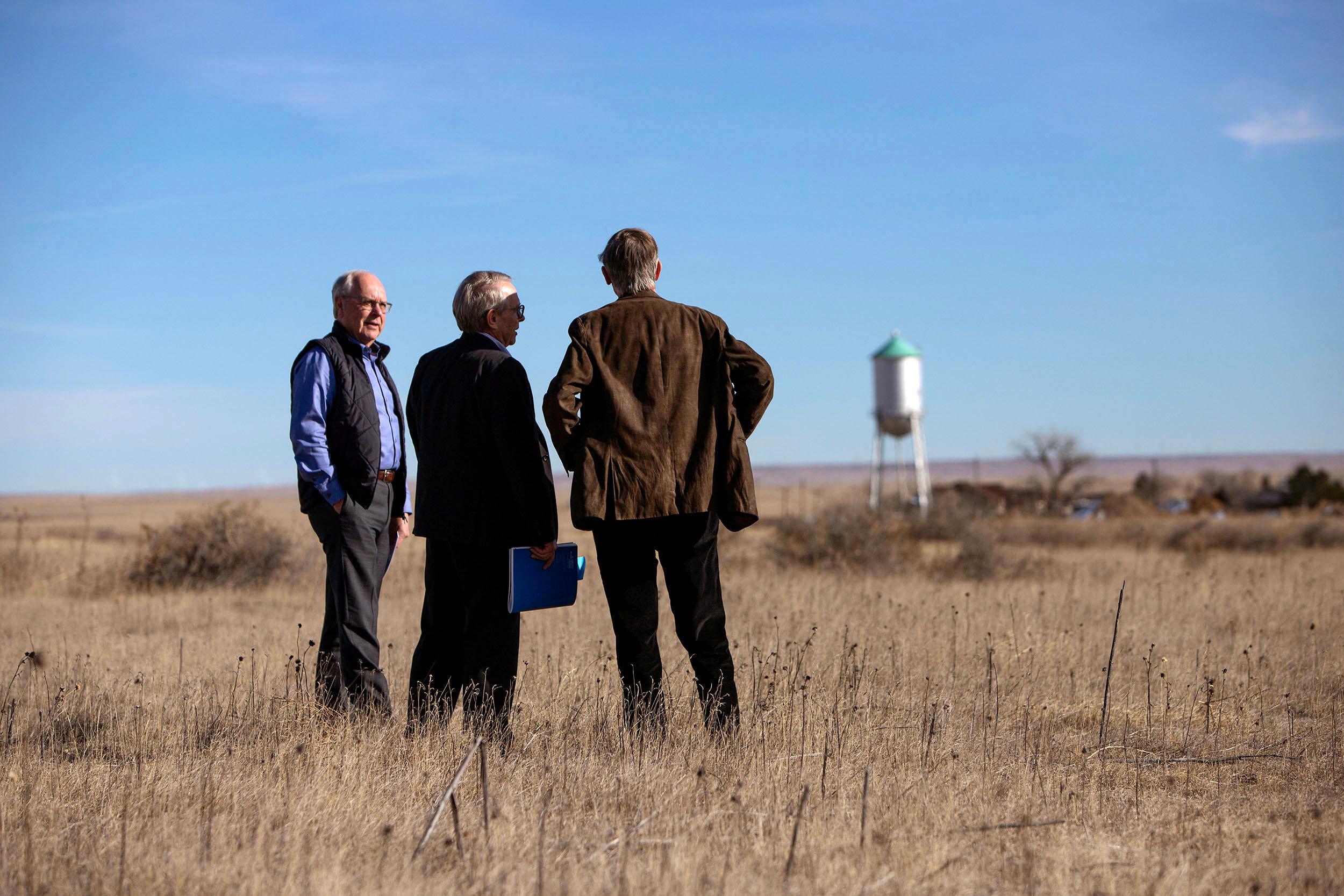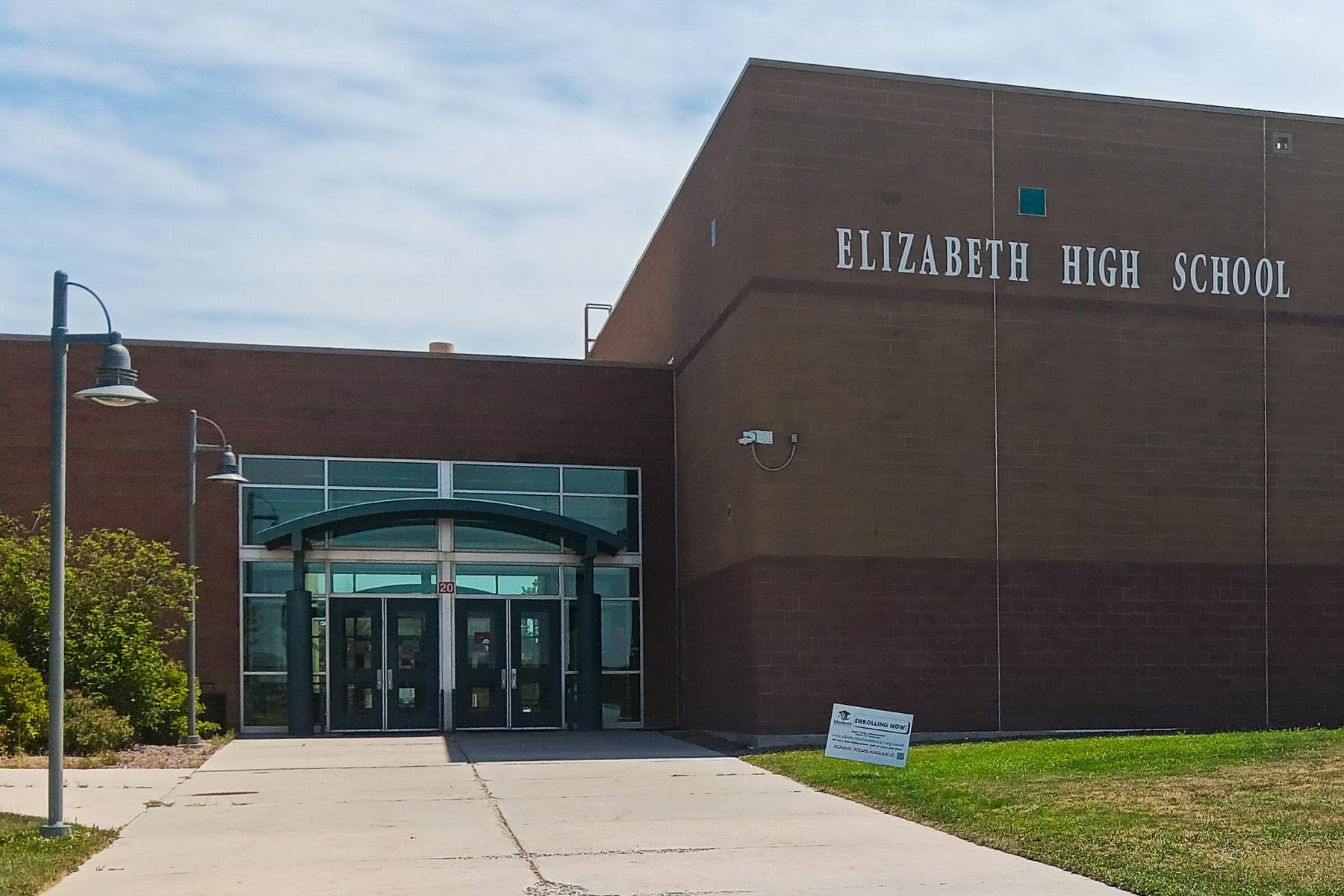
Updated -- Staff for Colorado Gov. John Hickenlooper, a Democrat, and Ohio Gov. John Kasich, a Republican, are working on a joint plan to stabilize the country's health insurance markets, which they see as a key first step to broader health care reform. Kasich told Colorado Matters that they expect to release it ahead of September hearings in the U.S. Senate. They also intend to get other governors from both parties to sign onto the plan, to show support at the state level.
"We're getting very close. I just talked to my guys today, men and women who are working on this with [Hickenlooper's] people, and we think we'll have some specifics here, I actually think we could have it within a week," Kasich said in a Monday joint interview with Hickenlooper.
The plan will flesh out a set of principles the two men wrote about in an op-ed in The Washington Post, where they said another one-party health care plan is "doomed to fail," just like the Republican plans considered this year.
"I'm not going to get into specifics with you until we have it all ironed out, but it's not going to be some pie-in-the-sky, way up there kind of stuff. There will be things that we will address that will have specific solutions. And one of the things we're finding out is the states do have some power to do some things unique to them, as long as these insurance markets are going to be stabilized," Kasich said.
One specific they agree on and would discuss: Their desire to change the Affordable Care Act mandate that employers with 50 or more employees provide insurance coverage. The governors say that number is too low, which deters hiring at small companies.
They also agree that the possibility of national single-payer coverage is not on the table in their discussions.
In recent months Hickenlooper and Kasich have appeared on national television shows to advocate for keeping the Affordable Care Act's Medicaid expansion intact. The two governors have even entertained running for the White House on a split ticket.
Also in the interview with Colorado Matters, Hickenlooper discussed the future of oil and gas regulation following a deadly home explosion killed two people in Firestone in the spring; and talked about why the state's first water plan is now reported to cost up to $40 billion.
Interview Highlights
The governors on whether they think health care should be a "right":
Hickenlooper: "I come from the school that I think it is a right. I'm not sure how much health care is included in that right, but some basic coverage."
Kasich: "I don't think that's that important in this. I mean we want everybody to have health insurance. I mean that's how I feel. Is it a right or is it a privilege or whatever? I don't know why that declaration is important... The question is how do you do it, and that's what we're working on... Primary care is important. Catastrophic coverage is important. We don't want anybody to get bankrupted because they get sick."
Hickenlooper on what he mosts wants to change about Obamacare:
"There are several important things but the probably top one on our list would be this notion of having some sort of reinsurance [using public money to help insure the sickest people], to make sure the high-cost pool is not causing higher rates for all the people seeking insurance on the private markets... You use reinsurance in almost every type of insurance program to cut off those 'hill tops' as we say."
Hickenlooper on why he believes his effort with Kasich may gain traction:
"[The Senate's health committee] is now holding hearings [starting Sept. 4] and hopefully in those hearings we'll get a chance to present, hopefully, what by that point a number of both Republican and Democratic governors think look like good ideas."
Read The Transcript:
Ryan Warner: Gov. Hickenlooper, Gov. Kasich, welcome to the program. Gov. John Hickenlooper: Thanks for having us. Gov. John Kasich: Thank you. RW: Gov. Hickenlooper, you’ve laid out some principles: health care reform should make health care more affordable, it should give power to the states, stabilize insurance markets. Those may sound great but they lack specifics. And so I understand you’re now working of specific proposals. When can we expect to see that plan for health care reform that your two offices are working on together? JH: Well, I think that over the next month or two, we will come forward. The key here is bi-partisanship and that doesn’t just immediately blossom forth. And there are some things that Gov. Kasich’s people disagree with our people. We’re trying to work through those things and figure out, you know, how we can make more stable the private insurance exchanges, but at the same time recognize we've got to control cost. JK: Let me jump in and try to answer this. Look, we’re getting very close. I just talked to my guys today, and men and women who are working on this with John’s people, and we think we’ll have some specifics here. John, I actually think we could have it within a week. You know, the Senate’s going to start in September and, you know, John and I are both willing to give on stuff. I mean, it’s not our egos in the middle of this. I’m now becoming more optimistic that we’re going to have a joint agreement which we'll then send to other governors. And in terms of the specifics, I’m not going to get into specifics with you until we have it all ironed out and I’m – it’s not going to some ‘pie in the sky, way up there’ kind of stuff, these will be things that we will address that will have a specific solutions. And one of the things we’re finding out is that the states actually do have some power to do some things unique to them as long as these insurance markets are going to be stabilized and there isn’t the threat like all of a sudden, there’s not going to be any of these cost-sharing funding. RW: You mentioned the cost-sharing reductions. These are payments to insurance companies to help cover low-income people, and they work to stabilize the market, and there’s been a lot of questions around their future whether the Trump Administration will continue paying them. So, I heard there that Gov. Kasich didn’t want to get too specific before a plan came out but I think it’s safe to ask what you each see as the most important thing to fix about the Affordable Care Act. Gov. Hickenlooper, why don’t you take that? JH: Well, I think that there are several important things but probably top on our list would be this notion of having some sort of reinsurance to make sure the high-cost pool is not causing higher rates for all the people seeking insurance in the private market. RW: Explain that to someone who doesn’t know what reinsurance is, just very briefly. JH: Sure. So what happens is, too often, people have been going onto the exchanges getting their insurance when they’re sick then when they get better, they get off the insurance. And so what happens is you have a concentration of people who are very expensive and have lots of illnesses on the insurance and some of them are very, very ill and have huge costs. We have several in the state that are $4 or $5 million a year. RW: And who thus raise the cost of insurance for everyone. JH: Right. Unless there’s some way of pulling or balancing that; pulling them out of the pool. And that’s – you use reinsurance in almost every type of insurance program to cut off those hilltops as we say. RW: Gov. Kasich, what is the first thing you’d fix about the Affordable Care Act? JK: Well, look, we’re just focusing on the insurance markets now and trying to stabilize them. We’re not even talking about Medicaid at this point because, you know, that’s part of Medicaid expansion but we’re not going to go there now. That should come later as part of an overall entitlement reform package. But my folks are saying that -- RW: That is to say your plan won’t touch Medicaid. It’s not looking at that. JK: No, we’re trying to stabilize insurance markets here first. I mean, you have to find things that you can agree upon and this is the most critical aspect of what needs to be fixed. So, and I don’t know what else. I can’t get into everything else because it’s complicated, a lot of insurance reform and it’s going to take me, personally, a number of hours to sit down to work through it all but I’m being told that we are getting extremely close to, we have a lot of areas that we agree upon, we have some areas that we are in some disagreement on that they’re going to work through in the next twenty-four, forty-eight, seventy-two hours and see if we can get somewhere where we have a complete package. RW: Can I have an example of where you have disagreed? JK: One of the issues is the individual mandate, what to do about that. John and I have talked about it. I said, you know, we have an individual mandate on car insurance and 15 percent of our people don’t have car insurance, so how do you deal with that? But one of the areas that I think we agree upon specifically is increasing the number of employees that would have to provide health insurance under the mandate. RW: That is to say, increasing the number of employees that a company must have if they provide health insurance. There are companies who say that’s just too low right now. JK: Yeah, the mandate. Right. So you don’t want to be putting smaller companies in a position where they won’t hire any more people because they can’t afford the mandate. What is most important to know is that John and I both agree we need to have a solid plan, not just some broad generalities but specifics. RW: I’d like to ask a more fundamental question because the guiding principles that you lay out don’t seem to say that health care is a right. Certainly, some people say it’s not the role of government to guarantee health coverage; others say, yes, it should be a fundamental right especially in a country that has the world’s largest economy. To each of you, is health care a right that should guide your efforts to reform the American system? Gov. Kasich? JK: Well, I don’t know. I don’t think that’s that important in this. I mean, we want everybody to have health insurance. I mean, that’s how I feel. Is it a right or is it a privilege or whatever? I mean, I don’t know why that declaration is important. I guess if I had to choose, I would say, yeah, everybody should have a right to have health insurance but so what? I mean, the question is how do you do it and that’s what we’re working on. So, philosophical debates are not as important as the need right now to make sure that these markets function and that people can get coverage. RW: Gov. Hickenlooper, how would you answer the question about right? JH: I would certainly agree with John that the real essence here, and the important thing is to begin working through the practical applications of how we get more people insured. I think we all agree to that. You know, I come from the school that I think it is a right. I’m not sure where we – how much health care is included in that right but some basic coverage. When I talk to most citizens of Colorado, they feel that some basic coverage should be everyone’s right. JK: John and I both agree. I think virtually all Americans agree. I don’t know anybody that doesn’t. We want to make sure that people have some decent coverage. Primary care is important. Catastrophic coverage is important. We don’t want anybody to get bankrupted because they get sick. So some sort of coverage for all Americans is ideal because if they don’t have any coverage then they end up living in the emergency room of hospitals, driving up costs. When they’re sicker, they don’t get treatment they want. So we’re both on the view that, of course, we want people to have health care coverage. So then if you get to the individual mandate and say okay, everybody should be forced to []. Well, is it going to work? I don’t know if it’s going to work. It doesn't work when it comes to auto insurance. Is an individual mandate going to work when it comes to health insurance? So we’re working around an issue like that, trying to come up with a solution. RW: A lot of proposed fixes to the Affordable Care Act involve more money from the federal governments, subsidies for insurance companies as we mentioned those cost-sharing reductions, $7 billion just last year alone. Will this plan require an infusion of federal cash do you think, Gov. Hickenlooper? JH: In its basic nature, our goal, at least my goal is to look at being cost-responsible. In other words, we will do everything we can not to add cost in terms of how we stabilize these private markets. That being said, if you’re looking at a reinsurance program, there’s going to be some cost there to make sure that it works. Ultimately, I think in cases like that, there will be corresponding savings by people having their, you know, lower insurance rates throughout the whole community, so there’s a way to recapture some of that money. RW: Gov. Kasich, I was reading back to your days in Congress in the ‘90s. You were known for being quite fiscally conservative, you favored a small federal government and according to the New York Times, emphasized individual responsibility for education and health care. It sounds like a lot of the conservative members of your party in Congress today, the very people you have to convince to support whatever plan you and Gov. Hickenlooper come up with. But you expanded Medicaid in Ohio and you recently vetoed an attempt to slow down that Medicaid expansion there. I wonder if your own opinions about health care have changed. JK: No, I don’t think I’m any different than where I was. I think that it is possible, when you’re running a government to make it more effective, more efficient and yet cover more people. I’ve been able to take a Medicaid program in Ohio that was growing at 9 percent and now grows at 3 percent and there are more people being helped. This is what John was saying at the top of the interview here. It’s very possible to grind out some efficiencies while at the same time making a program work better. I mean, I remember when Kindle first came out. RW: The eBook. JK: You know, the Kindle device cost a lot of money, okay? Now, they like give you one, right? And so, it’s more effective and it costs less. RW: Before we go, you both talked about covering everyone. If it’s not a right, at least that’s the goal. Some might hear that and say, “Single payer is the answer. That’s a way to cover everyone.” Just briefly, is that on the table in these discussions or is that a non-starter? Gov. Hickenlooper? JH: If it’s something we’re discussing, I haven’t heard it. RW: Okay, you’ve not brought it to the table. Gov. Kasich? JK: No, no, no. Look, the problem with single payer is, we have three single payer systems in the country. One is called Medicaid, one is called Medicare, and one’s called the VA. The single payer is not an answer but, you know, the single payer that we have needs to be improved and the innovation we get from the private sector can help it serve people better. RW: Gov. Kasich, we’re going to let you go. Thank you for your time. JK: It’s good to be with you. Thank you. RW: One last item though on health care, Gov. Hickenlooper. Before we move on, you did tell constituents last week that this partnership you have with Gov. Kasich is gaining traction in Congress. Why do you say that? What evidence do you have? JH: Well, because the Problem Solver’s Group in Congress, there are forty Republicans and Democratic members of Congress that are – have taken this up and they’re going to look for some constructive solutions. Also, Senator Murray and Senator Alexander, again, are Democrats. Senator Murray from Washington, Senator Alexander from Tennessee, they are now holding hearings and hopefully in those hearings we’ll get a chance to present, hopefully by that point a number of both Republican and Democratic governors think look like good ideas. RW: State regulators and Colorado’s Attorney General recently warned the community of Thornton that the rules it’s considering this month to limit drilling are illegal. How many more of these types of letters have been sent to other communities in Colorado recently? JH: I don’t know. I haven’t been briefed on that recently. So I do know that we occasionally and again, it’s not like once a year, it’s more frequently than that, have city councils or town councils that feel strongly, largely as a reflection of their citizens that they want to have a stronger voice in limiting oil and gas activity in their community. So -- RW: And should every community that raises that voice expect a letter from the state? JH: If they are proposing laws or regulations that we think are in conflict with state law and have the potential to be judged by a court as a taking of people’s private property, yes, we will send them a letter. RW: The property being the minerals beneath the surface you’re saying? JH: Yes. There are many cases – older retired people that they’ve owned those minerals for sometimes generations and all of a sudden we say, “Alright. Now, it’s going to be a 2,500 foot setback”. And in some cases, that means that those minerals are suddenly, overnight, through the action of a local government, without value. RW: The question of whether there should be more oil and gas regulation is also playing out in the courts. There’s a potentially huge court decision that opens the door for state regulators to consider public health and the environment much more in its permitting. We're waiting to see if the Colorado Supreme Court will take that up or let the lower court ruling stand. A teenage climate activist brought this case forward. How big a deal would it be if this ruling stands? How much would it change the decisions about where drilling can happen in Colorado? JH: Well, there’s a lot of debate. And I’m not a lawyer – I look at it – I think the Colorado Oil and Gas Conservation Commission has a tremendous focus on making sure that the public safety is always first and foremost, so I don’t think it would have that large a difference but there are a lot of people that disagree with me and think it would change what local communities can do and how the Oil and Gas Conservation Commission would have to respond to some of these local communities. RW: Finally, to water. You signed the State’s first water plan in late 2015. At that time, it was estimated to cost about $20 billion to implement. That was a jaw-dropping figure back then. We just learned it could double to $40 billion. What the heck would all that money go towards? JH: Well, let’s be blunt. I don’t think there was a doubling. The water plan was looking at capacity. So, how do we have enough reservoirs or other places to store water? It could be old ground water reservoirs but what is our ability? How much water do we need to be able to store and deliver and use to make sure we can maintain our agricultural industry as well as our urban and commercial industries? That was where the $20 billion – Yeah, I was going to say million but I knew you’d never let me get away with it. The extra $20 billion is money that is going to be used. To a large extent, that comes from water treatment centers. So that’s a whole different – you know, you get your bill at home. You get a water bill. That’s what you’re paying to get water in your house then you’ll also get a sewage bill, waste water bill, and that’s what we all pay to have our water treated once we’re done with it. And that waste water treatment bill was not intended to be in the Colorado water plan. So that’s something we’re going to be spending money on. And everyone – all – we all pay our bills and that’s how that money, gets paid for. Are there some gaps in waste water? Probably some. It’s not – I don’t think it’s $20 billion. Most of that – the bills we pay are generally enough to take care of that although some communities have gaps. RW: So you think the $20 billion related to waste water should not be lumped in with the $20 billion for the statewide water plan? JH: No. RW: Where is this money going to come from even if it’s the half figure? JH: So the original $20 billion, if you sit down and look at it, there’s $12 billion to $14 billion are going to come from paying your water bill just like everyone already does, then there are severance taxes. So a chunk of what the state collects for severance taxes from oil and gas activity goes towards water projects. So there’s several billion dollars in there. We do have a gap of several billion in just that – in the water plan – and we’re working on trying to figure out where does that come from. But that’s three out of twenty, it’s not a huge thing. And it’s important for people to remember, before they get really agitated, what we’re trying to do here is to keep water on agricultural land, right? The worst case scenario is, I mean, that we dry up, a part of our agricultural landscape. It does not mean that Denver or Aurora or Fort Collins or Pueblo or Grand Junction go dry. RW: And why is it important to you that this arid state continue to be a huge ag producer? JH: Well, a, it’s a huge part of our economy, right? You’re looking at close to $40 billion a year or over $40 billion a year but even more deeply than that, it’s an issue of sustainability. You want to have your own food resources close to where your state is in case something terrible happens. It’s basic long-term sustainable planning. RW: Governor, thank you for being with us. JH: Sure. Always a pleasure. |
Editor's note: This story has been updated to clarify the scope of the governors' work, which focuses on stabilizing the country's health insurance markets.









